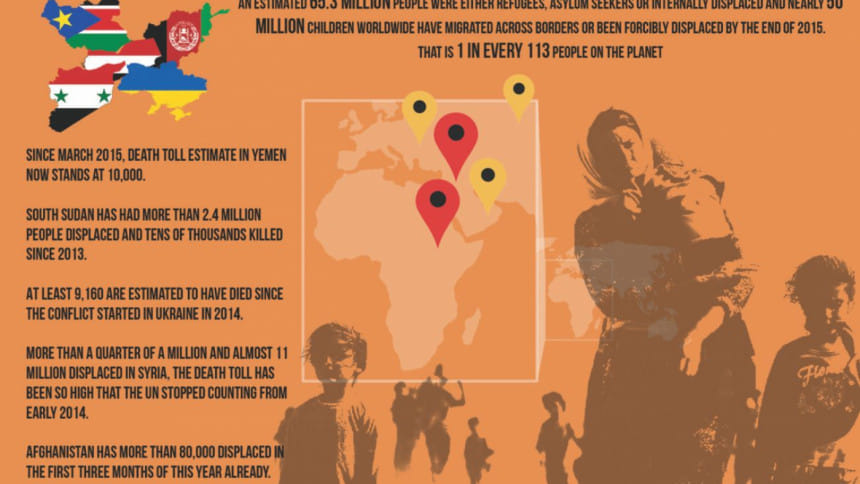War drums louder than ever

Today, the world is celebrating the International Day of Peace. It is inaugurated by ringing the United Nations Peace Bell at the UN Headquarters. An inscription on its side reads, "Long live absolute world peace". Unfortunately, however, 34 years since its inception, we now live in a world absolutely opposed to that vision — a world that is anything but peaceful.
According to the Global Peace Index, there are now only 10 countries in the world that are actually free from conflict and we are now further away from world peace than at any other time in the past 10 years (Global Peace Index 2016: There are now only 10 countries in the world that are actually free from conflict, The Independent, June 8). And why would we not be? When, instead of making progress towards peace, the only progress we are making is in inventing more and more sophisticated ways of causing more and more violence to fatten the pockets of vested interests — namely arms manufacturers.
This has led to the number of people displaced by conflict being at the highest level ever recorded, says the UN refugee agency (Refugees at highest ever level, reaching 65m, says UN, BBC News, June 20). It estimates that 65.3 million people were either refugees, asylum seekers or internally displaced at the end of 2015, which, shockingly, represents one in every 113 people on the planet. On the flipside, if we look at battlefield deaths, they are up at 112,000 a year — a 20-year high. Such has been the scale of violence we have perpetrated.
Neither have we spared, to our shame, children, from the horrors of war. Nearly 50 million children worldwide, according to another UN report, have migrated across borders or been forcibly displaced by conflicts (Conflict and Poverty Have Uprooted Nearly 50 Million Children, U.N. Says, The New York Times, September 6). We see illegal foreign interventions — without the necessary UN Security Council authorisation — raging from Yemen to Iraq, civil wars being fought from South Sudan to Ukraine, extremist attacks being perpetrated by Boko Haram and ISIS, without much of a peep from the world media except, of course, when convenient.
The Saudi-led war grinding on in Yemen since March 2015 is a case in point. The latest death toll estimate in Yemen, according to the UN, now stands at 10,000 with Jamie McGoldrick, the UN humanitarian coordinator, admitting that "[the UN] know the numbers are much higher but we can't tell you by how much" (UN: At least 10,000 killed in Yemen conflict, Al-Jazeera, August 31). Yet, how often do we see the media reporting on it? Moreover, the conflict has already displaced three million Yemenis, forcing 200,000 people to seek refuge abroad. Meanwhile, 14 million of Yemen's 26 million people need food aid and seven million are suffering from food insecurity.
Even the world's newest country South Sudan, which came into being in 2011 after a long period of crisis, again exploded into civil war in 2013, and has had more than 2.4 million people displaced and tens of thousands killed (10 Conflicts to Watch in 2016, Foreign Policy Journal, January 3). In Ukraine, at least 9,160 are estimated to have died since the conflict started in April 2014, by the UN (Death Toll in Ukraine Conflict Hits 9,160, U.N. Says, The New York Times, March 3). Then there is of course all the deaths being caused by radicals of every shape and size across the world, reaching a point where keeping a body count is near impossible. Concurrently, the dissensions in Iraq and Libya continue unabated, leading to unending sufferings for its peoples.
Another country that has been mired in crises is Afghanistan. With more than 80,000 people displaced in the first three months of this year already, the Afghan conflict continues to affect lives in record numbers (Civilian Casualties in Afghan War Are Unabated in 2016, The New York Times, April 17). Furthermore, according to the United Nations human rights director in Afghanistan, "almost one-third of civilian casualties [in the first quarter of 2016] were children" — an all too familiar trend worldwide.
Yet, amidst all these crises and more, none that we know of perhaps comes anywhere close to the magnitude of violence and sufferings Syrians are experiencing. In what has been dubbed as the deadliest conflict of the 21st century, more than a quarter of a million Syrians have been killed and almost 11 million — about half the country's population — displaced in or outside the country. The death toll has been so high that the UN, after estimating 250,000 fatalities, stopped counting Syria's dead early in 2014. According to the Syrian Centre for Policy Research, however, fatalities caused by the war, directly and indirectly, amount to 470,000, with 11.5 percent of Syria's population being wounded or killed since 2011 (Report on Syria conflict finds 11.5 percent of population killed or injured, The Guardian, February 11).
In Syria's case what is also concerning, is that with arms pouring into the country from every nook and corner, and with the entry of regional as well as global, nuclear powers, into the mix, the Syrian crisis can turn into a much bigger global crisis in a matter of minutes. Tensions are already running high. And amidst all these wars, although one would expect to hear calls for peace, what we see the most militarily powerful nations in the world do, is prepare for more war.
Earlier this year, we saw NATO and its partner countries hold the largest war games in Eastern Europe since the end of the Cold War in what was clearly a show of strength against Russia (Nato countries begin largest war game in eastern Europe since cold war, The Guardian, June 6). And in case it was not, the Russians clearly saw it that way. And in response, held one of its largest ever military drills in Crimea (Russia Holds Biggest Military Drill Yet in Annexed Crimea, NBC News, September 11). Asia too seems to be simmering. With tension between North and South Korea rising, Seoul holding its largest ever artillery drill and Washington's pivot to Asia, China and Russia just held the largest military drills ever by the two countries' navies together, in the hotly contested South China Sea (China, Russia naval drill in South China Sea to begin Monday, Reuters, September 11).
Hence, on the International Day of Peace, it is peace which remains most elusive. During this year's Peacebell Ceremony to commemorate the day, the UN Secretary General remarked, "Peace is not a gift. Peace is something we must all work for, every day, in every country." Over the years, it is perhaps this message which we have failed to heed the most.
For among the ringing peace-bells, while much of the world turns into outstretched graveyards, the majority, which claims to be against wars, and those who are celebrating International Day of Peace, as a display of their support for peace, remain as quiet as the grave to most of the injustices that are being brought to millions of people around the world, courtesy of wars being waged, in most cases, under false pretences. While the only sound that has any significant bearing on human lives, are the war drums, constantly being beaten, louder and louder, everyday. And the global media, especially the more powerful sections of it, continue to subscribe to people's ignorance through their selective coverage of conflicts, contributing to the world moving further and further away from peace, than at any other time in the recent past.
The writer is a member of the Editorial team.

 For all latest news, follow The Daily Star's Google News channel.
For all latest news, follow The Daily Star's Google News channel. 




Comments